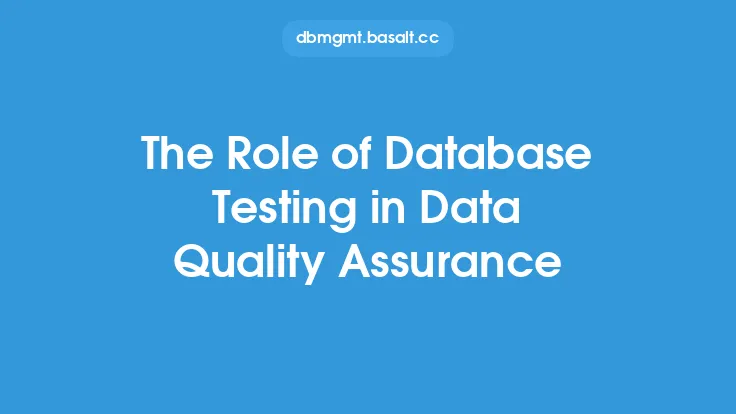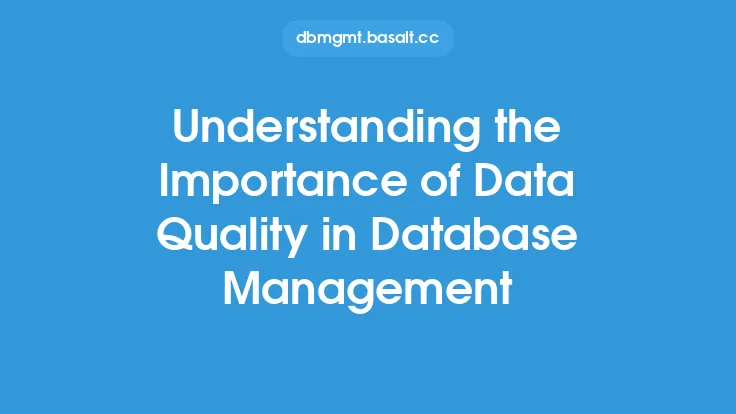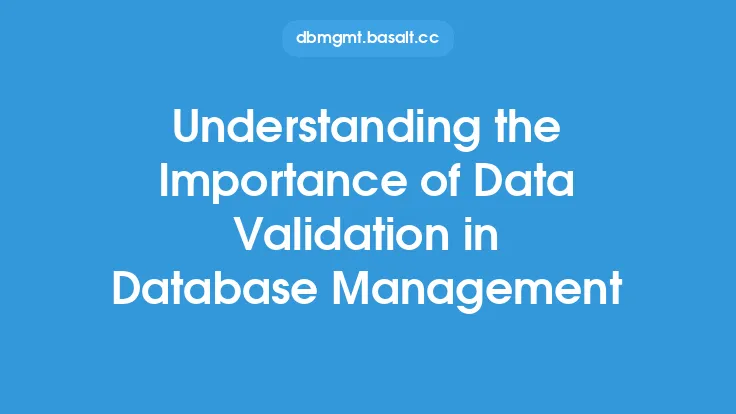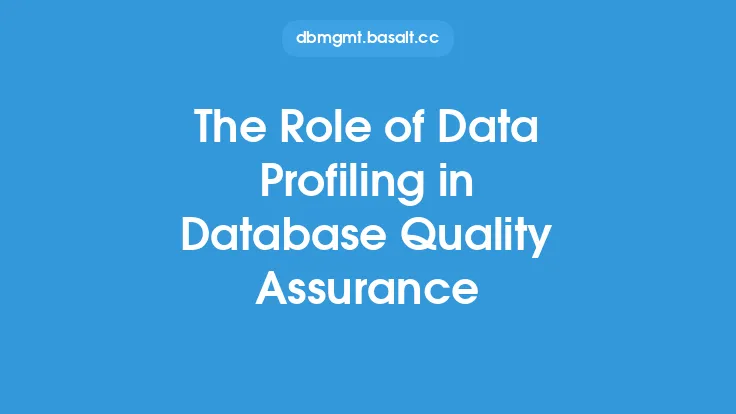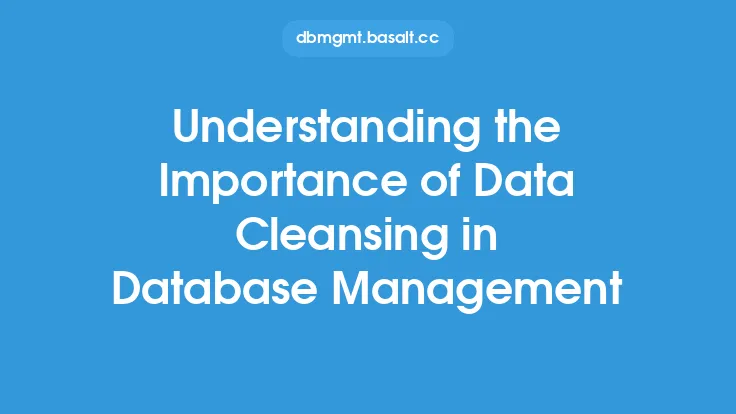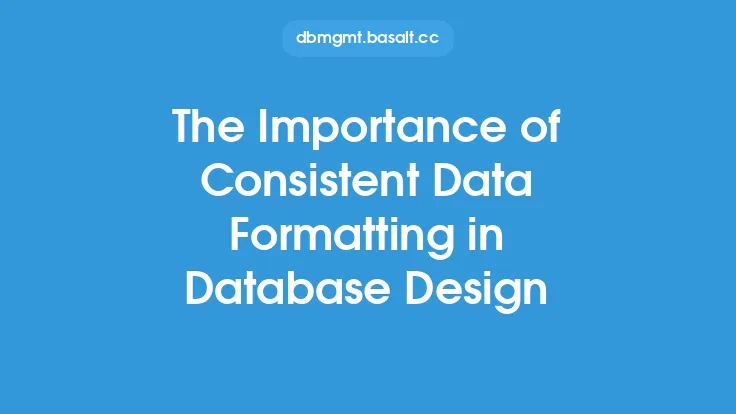Data validation is a critical component of database quality assurance, as it ensures that the data stored in a database is accurate, complete, and consistent. The process of data validation involves checking the data for errors, inconsistencies, and conformity to predefined rules and formats. This is essential to maintain the integrity and reliability of the data, which is crucial for making informed business decisions, providing high-quality services, and ensuring compliance with regulatory requirements.
Introduction to Data Validation
Data validation is a systematic process that involves verifying the data against a set of predefined rules, constraints, and formats. The goal of data validation is to detect and prevent errors, inconsistencies, and inaccuracies in the data, which can compromise the quality and reliability of the database. Data validation can be performed at various stages of the data lifecycle, including data entry, data import, and data update. The validation process can be manual or automated, depending on the complexity and volume of the data.
Types of Data Validation
There are several types of data validation, including:
- Format validation: This involves checking the data for conformity to a specific format, such as date, time, or phone number.
- Range validation: This involves checking the data to ensure that it falls within a specified range, such as a valid age or salary range.
- Code validation: This involves checking the data against a set of predefined codes, such as country codes or product codes.
- Cross-validation: This involves checking the data against other related data to ensure consistency and accuracy.
- Business rule validation: This involves checking the data against a set of predefined business rules, such as checking for valid combinations of data values.
Benefits of Data Validation
Data validation offers several benefits, including:
- Improved data quality: Data validation ensures that the data is accurate, complete, and consistent, which improves the overall quality of the database.
- Reduced errors: Data validation detects and prevents errors, which reduces the risk of data inconsistencies and inaccuracies.
- Increased reliability: Data validation ensures that the data is reliable and trustworthy, which is essential for making informed business decisions.
- Compliance with regulatory requirements: Data validation ensures that the data is compliant with regulatory requirements, such as data protection and privacy laws.
- Improved data security: Data validation helps to prevent data breaches and cyber attacks by detecting and preventing invalid or malicious data.
Data Validation Techniques
There are several data validation techniques, including:
- Data type checking: This involves checking the data type to ensure that it conforms to the expected type, such as integer or string.
- Regular expression validation: This involves using regular expressions to check the data for conformity to a specific pattern or format.
- SQL constraints: This involves using SQL constraints, such as primary keys, foreign keys, and check constraints, to enforce data integrity and validity.
- Data validation rules: This involves defining data validation rules, such as business rules or data quality rules, to check the data for validity and consistency.
Data Validation Tools and Technologies
There are several data validation tools and technologies available, including:
- Data validation software: This includes software tools, such as data quality software, data validation software, and data profiling software.
- Data validation frameworks: This includes frameworks, such as data quality frameworks, data validation frameworks, and data governance frameworks.
- Data validation libraries: This includes libraries, such as data validation libraries, data quality libraries, and data profiling libraries.
- Database management systems: This includes database management systems, such as relational databases, NoSQL databases, and cloud databases, which provide built-in data validation features and tools.
Best Practices for Data Validation
There are several best practices for data validation, including:
- Define clear data validation rules: This involves defining clear and concise data validation rules to ensure that the data is valid and consistent.
- Use automated data validation: This involves using automated data validation tools and technologies to improve efficiency and accuracy.
- Perform data validation at multiple stages: This involves performing data validation at multiple stages of the data lifecycle, including data entry, data import, and data update.
- Monitor and report data validation results: This involves monitoring and reporting data validation results to ensure that the data is valid and consistent.
- Continuously review and update data validation rules: This involves continuously reviewing and updating data validation rules to ensure that they remain relevant and effective.
Common Data Validation Challenges
There are several common data validation challenges, including:
- Data complexity: This involves dealing with complex data structures, such as nested data or hierarchical data.
- Data volume: This involves dealing with large volumes of data, which can make data validation challenging and time-consuming.
- Data variety: This involves dealing with diverse data sources and formats, which can make data validation challenging and complex.
- Data quality issues: This involves dealing with data quality issues, such as missing or duplicate data, which can compromise the accuracy and reliability of the data.
- Regulatory requirements: This involves complying with regulatory requirements, such as data protection and privacy laws, which can be challenging and complex.
Conclusion
Data validation is a critical component of database quality assurance, as it ensures that the data is accurate, complete, and consistent. By using data validation techniques, tools, and technologies, organizations can improve the quality and reliability of their data, reduce errors and inconsistencies, and comply with regulatory requirements. By following best practices for data validation and addressing common data validation challenges, organizations can ensure that their data is valid, consistent, and reliable, which is essential for making informed business decisions and providing high-quality services.
